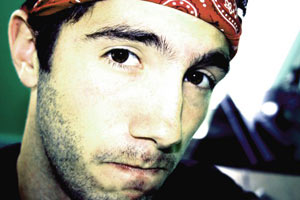"Which do you suppose is greater," the Egyptian asked his French friend, "the torch or the sun?"
The two men sat at an outdoor café across the street from the warm Mediterranean Sea. They had become friends many years before when they both had attended a semester at Oxford University. The Frenchman was on a business trip in Cairo and hired a coach to Alexandria to visit his old friend for the weekend.
"Alas," replied the Frenchman, after pondering the curious question for a few moments, "I think the torch is greater."
Both men were just at the crest of their senior years. The Egyptian carried a few more pounds than his wife preferred, but he cleverly hid it under his loose fitting galabaya. His skin was more weathered than his European friend's, but his eyes still shown with his characteristic wit. The Frenchman, a slimmer figure, had thinning gray hair, round spectacles, and sported a scholarly, leather-elbowed suit coat despite the humidity.
"Because?" Asked the Egyptian with a slight smile.
The Frenchman paused for a moment, as if deciding whether or not to play along with what he knew was an invitation to a philosophical joust. "Well," he said, resigning himself to the game, "I am aware that the sun is vastly brighter and more comprehensive in its ability to give light to the earth. However, its power is confined, limited to shine for only part of the day. It is the torch that is versatile. When the sun, it all of its greatness, goes down, it is the torch that lights the way of men. It is by the light of the torch that toil can continue through the darkest of human hours and progress can be made in spite of natural cycles. Thus, it is the torch that frees man from his slavery to planetary rotations."
"Well said," mused the Egyptian. "When the earth turns its back on the sun, we do indeed need torches to light our way. I must point out, though, that the sun is not useless at night. On the contrary, the sun fills the earth with its warmth which, although somewhat less noticeable during the night, quietly sustains the earth and its life throughout its period of darkness. And it does not leave the earth in utter darkness; it reminds the earth of its presence by reflecting its light off the moon. Perhaps the sun knows that man needs both darkness and light in turn. Whatever the case, the significance of the brightness of the sun as compared to the torch cannot be lightly brushed aside. The limited capacity of the torch can lead to perceptual errors that become clear by the overwhelming light of the daytime sun. Details hidden by the flickering of the flames are revealed by the sun's steady radiance. The torch only allows one to see a short distance ahead, but the sun, in its glory, allows man to see infinitely further, to plan routes and understand terrains."
The conversation paused as a young Arab waiter appeared with two glasses of mint tea, fresh mint leaves, and a tall water pipe for the two to share. The Frenchman stirred his tea and took a few sips, but his friend could see, through puffs of shisha smoke, that he was thinking hard on his next reply. The Egyptian grinned, he always enjoyed rather strange, playfully intellectual discussions and missed his years in university.
"Ok," The Frenchman replied at last, setting down his tea and leaning back in his chair, "Of course I cannot debate the immense ability of the sun to illuminate and clarify during the day. And yet, even during the day the sun has a limitation. Man does not spend all of his time outdoors. And although it is true that many buildings have enough windows to allow the sunlight to flood their interiors, some do not. Basements, for instance, or impenetrable fortresses, or deep inner rooms. Consider caves, for that matter. It seems that it is a matter of control. The torch can be actively used and controlled by man, he can use it to light dark places when they need to be light, and he can darken them when they need to be dark. He can explore the crevices and caverns where the sun's light never reaches. The sun cannot be built upon, added to, brightened, dimmed, or changed. It has no potential for increased utilization. Indeed, man cannot even perceive its center, but only its reaches. It is hard to look upon and harder still to understand. It is the torch that can be understood, manipulated, and controlled."
The Egyptian passed the long slender hose from the water pipe to the Frenchman, scratched his head, and began his reply. "You are right," he offered, "in your assertion that the torch is more easily controlled than the sun. It is better understood and its center can truly be seen—especially after is has been doused in water. But, is control always such a good thing? The sun may never have been used to go spelunking, true, but then neither has it been used for felony. Never has the sun been used to burn down the house of a disliked neighbor or to light an enemy's crops ablaze and cause widespread suffering. No, mischief is the domain of the torch as it is indeed subject to the control of the men who carry it."
"You are missing one thing," interjected the European, "although the torch may be used for mischief, it is important for something very core to mankind: food. It is the torch, as well as other forms of controlled fire, that are used to cook and to cleanse."
"Ah," returned the Egyptian, "again you are very right, except that it is the sun which feeds the plants, which in turn not only provide us and the animals with food, but also with the very oxygen that sustains us. It is the sun that maintains the life cycle, stimulates growth, and simultaneously holds our solar system in an astonishingly delicate balance."
"Alas!" Chuckled the Frenchman, "The sun is very great, but the torch is very necessary. Perhaps, then, we should both concede that each have their place and work together to both sustain life and facilitate progress."
The Egyptian smiled and nodded his head slightly, "Indeed. It is unavoidable."
"So then what was the point of the game this time?" Asked the Frenchman, knowing his friend quite well.
"Just this," replied the Egyptian, "We must never forget the sun or trust too much in our torches. For when the morning light floods the earth, torches become pale and their light nearly invisible. The light of the sun is sure, while that of the torch casts as many shadows as illuminations. And, in the end, it is only by the light of the sun that we can make torches at all. The torch depends on the sun. Without the sun, the torch is bound go out, and life itself will disappear with it."
Inspired by Isaiah 50:10-11

